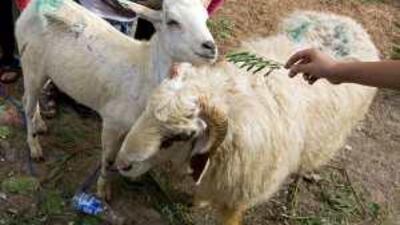ABU DHABI // From slaughterhouses to sweet shops, establishments handling food will be under "intense" scrutiny from inspectors during Eid. The Abu Dhabi Food Control Authority announced the plan after disclosing that 11 restaurants were shut down, 35 fines were issued and 900 violations were uncovered following August inspections.
"We will have an intense campaign. Inspectors will be working throughout Eid and will respond to complaints on our hotline," said Mohamed al Reyaysa, the authority's spokesman. Veterinary doctors are to visit slaughterhouses to inspect animals, and spot checks will concentrate on sweet shops and bakeries because they are expected to face high demand, Mr al Reyaysa said. People may report unclean conditions by calling 800 555. One of the 2,106 spot checks conducted last month found an incident of food poisoning at a restaurant in Musaffah, which was closed for several days. A dozen labourers were taken to the hospital after eating its food.
The workers' company used the restaurant's catering service even though it was not equipped to provide food to large numbers of people, said Mr al Reyaysa, who would not name the restaurant. "It is evidence that these companies do not refer to the authority when it comes to food safety issues," he said. "We ask institutions which provide food to their workers to refer to the authority for the names of food establishments that can cater to their needs."
The restaurant's small size meant it could not handle the storage of large quantities of food, Mr al Reyaysa said. Also, it has a small kitchen where "everything can get mixed up", such as chicken and vegetables, a hazard that can spread salmonella, he said. The case was referred to court, which meant the restaurant could incur a fine, according to Mr al Reyaysa. The authority also destroyed 1.3 tonnes of products at meat counters in August, and issued 16 fines but did not mandate any closures, after 2,503 visits to the counters, hotels, educational institutions and factories.
Meat counters belonging to Lulu Hypermarket and Carrefour, two of the country's biggest chain stores, were closed in July after being accused by the authority of "trade fraud" for re-labelling meat products and selling expired meat, as well as for unsafe practices. A Lulu Hypermarket spokesman said the violations were not a result of corporate policy and that food safety standards had been improved since July, with managers and food handlers taking part in food hygiene training mandated by the authority.
"We were not intentionally doing anything wrong," the spokesman said. He added that Lulu would ensure "that this does not happen again", but declined to elaborate. Representatives of Carrefour were not available for comment. Also notable in the report was the rejection and destruction of more than 63 tonnes of imported food at al Ghuwaifat on the Saudi-UAE border, representing more than 95 per cent of imported food that was rejected in Abu Dhabi.
The reasons cited were "violating health conditions", lack of expiry and production dates, and mould. "Al Ghuwaifat is a primary border crossing, and a lot of food comes through the border, especially during Ramadan when there is a lot of demand," Mr al Reyaysa said. Food coming through the area originates from many Arab countries, with the majority passing through Saudi Arabia. In June, lorry drivers carrying food and other goods across the border into Saudi Arabia were left stranded in the heat after the kingdom said it had introduced new procedures to govern its borders.
Mr al Reyaysa denied the spoiled food was a result of delays on the border crossing, blaming it instead on differences in standards. Last week, the authority released figures for the first 10 days of Ramadan: after 1,266 visits to restaurants, bakeries, coffee shops, catering companies, supermarkets and vegetable and fruit markets, 359 warnings were issued. The authority recorded 12 more serious violations, but did not close any stores.
newsdesk@thenational.ae


